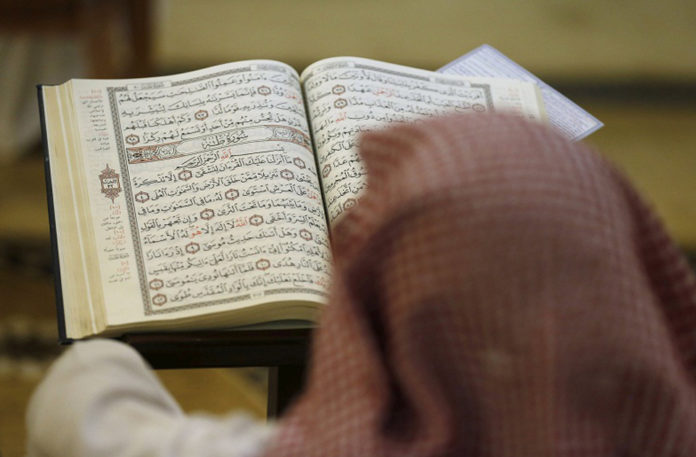Úä ÃÈí ÐÑ ÑÖí Çááå Úäå ÃíÖÇ ¡ Ãä äÇÓðÇ ãä ÃÕÍÇÈ ÑÓæá Çááå Õáí Çááå Úáíå æÓáã ÞÇáæÇ ááäÈí Õáí Çááå Úáíå æÓáã : íÇ ÑÓæá Çááå ÐåÈ Ãåá ÇáÏËæÑ ÈÇáÇÌæÑ º íÕáæä ßãÇ äÕáí ¡ æíÕæãæä ßãÇ äÕæã ¡ æíÜÊÜÕÜÏ ÞÜÜæä ÈÝÜÖÜæá ÃãÜæÇáåã . ÞÜÇá : ( ÃæáÜíÜÓ ÞÜÏ ÌÚÜá Çááå áßã ãÇ ÊÕÏÞæä ¿ Åä áßã Èßá ÊÓÈíÍÉ ÕÏÞÉ ¡ æßá ÊßÈíÑÉ ÕÏÞÉ ¡ æßá ÊÍãíÏÉ ÕÏÞÉ ¡ æßá ÊåáíáÉ ÕÏÞÉ ¡ æÃãÑ ÈÇáãÚÑæÝ ÕÏÞÉ ¡ æäåí Úä ÇáãäßÑ ÕÏÞÉ ¡ æÝí ÈÚÖ ÃÍÜÏ ßã ÕÜÏÞÜÉ ).
ÞÇáæÇ : íÇ ÑÓæá Çááå ¡ ÃíÃÊí ÃÍÏäÇ ÔåæÊå æíßæä áå ÝíåÇ ÃÌÑ¿
ÞÇá : ( ÃÑÃíÊã áæ æÖÚåÇ Ýí ÍÑÇã ¡ ÃßÇä Úáíå æÒÑ ¿ ÝßÐáß ÅÐÇ æÖÚåÇ Ýí ÇáÍáÇá ¡ ßÇä áå ÃÌÑ ).
ÑæÇå ãÓáã [ ÑÞã : 1006 ]
Also on the authority of Abu Dharr (radiAllahu anhu) that some people
from amongst the Companions of the Messenger of Allah (sallAllahu
alayhi wa sallam) said to the Prophet (sallAllahu alayhi wa sallam) :
| O Messenger of Allah, the affluent have made off with the rewards; they pray as we pray, they fast as we fast, and they give [much] in charity by virtue of their wealth.
He (sallAllahu alayhi wa sallam) said : Has not Allah made things for you to give in charity ? Truly every tasbeehah [saying: subhaan Allah] is a charity, and every takbeerah [saying: Allahu akbar] is a charity, and every tahmeedah [saying: al-hamdu lillaah] is a charity, and every tahleelah [saying: laa ilaaha illaa Allah] is a charity. And commanding the good is a charity, and forbidding an evil is a charity, and in the bud’i [sexual act] of each one of you there is a charity. They said : O Messenger of Allah, when one of us fulfils his carnal desire will he have some reward for that ?! He (sallAllahu alayhi wa sallam) said : Do you not see that if he were to act upon it [his desire] in an unlawful manner then he would be deserving of punishment ? Likewise, if he were to act upon it in a lawful manner then he will be deserving of a reward. |
It was related by Muslim.
Explanation of Hadeeth Number 25
In the arabic the word used for affluent is ‘duthoor’ which implies a
large amount of wealth. And in this hadeeth is an explanation of the
Virtue of reciting tasbeeh and all of the other forms of dhikr
(remembrance) of Allah, and of ordering the good and forbidding the
evil, and of ensuring that one has the intention of Pleasing Allah even
in the Mubaah (Permissible) actions, for by having such pure intentions
they turn into actions of Obediance, deserving of reward.
And in this hadeeth is proof that it is permissible to ask a scholar
about the evidence for some of the things in the scholar’s fatwaa (legal
verdict) that are not apparent to the questioner, as long as it is clear
that the scholar does not dislike this and the questioning is done in a
respectful fashion.
And his (sallAllahu alayhi wa sallam) statement “And commanding the good is a charity, and forbidding an evil is a charity” is an indication that every single type of ordering the good or forbidding the evil carries the ruling of being a charity. Indeed, it is greater than the
tasbeeh and the other forms of dhikr mentioned after it, because
ordering the good and forbidding the evil is a Fard Kifaayah (Collective
Obligation), and at times it may become obligatory upon every
individual, and this is opposite to the case of the adhkaar (plural of
dhikr) mentioned previously, which are only nawaafil (voluntary deeds).
And the reward of performing the Obligatory deeds is much greater than
that of the Voluntary deeds, as the statement of Allah ‘azza wa jall in
a hadeeth Qudsee indicates : “And My slave does not come closer to Me by anything more beloved to Me than the deeds that I have Obligated upon him” [narrated by al-Bukhari]. Some of the ‘ulamaa have said that the reward for the obligatory deeds is greater than that for the voluntary
deeds by seventy levels, as is indicated by some ahaadeeth.
And as for his (sallAllahu alayhi wa sallam) statement : “and in the bud’i (sexual act) of each one of you there is a charity” then the word “bud’i” is a general term that encompasses the meaning of intercourse and also the private parts themselves, and both of them correctly convey
the intended meaning here. And it has already been mentioned that the
Mubaah (Permissible) actions – ie not Obligatory nor Recommended –
become like acts of Obediance, which are rewarded for, through the
presence of the correct intention. So the act of intercourse also
becomes an act of worship, if by it a person intends to fulfill the
rights of his wife, and to live with her in a good way, or to seek a
pious child, or as a protection for himself or his wife from illegal
desires, or other than these from the praisewrothy purposes.
And their statement (radiAllahu ‘anhum) : “O Messenger of Allah, when one of us fulfils his carnal desire will he have some reward for that ?” and his (sallAllahu alayhi wa sallam) reply : “Do you not see that if he were to act upon it [his desire] in an unlawful manner then he would be deserving of punishment ?” until the end of the hadeeth, then this indicates the permissibilty of Qiyaas (using analogy to derive rulings), and this is the madhhab of the ‘ulamaa, and none are opposed to this except the Dhaahiriyyah (Literalists – referring to the school of
Daawood adh-Dhaahiree). And as for what has been narrated from some of
the Taabi’een (the generation after the Sahaabah) and from other
scholars to the effect that Qiyaas is rejected and blameworthy, then
what they intended was not the Qiyaas that is known by the Mujtahid
Fuqahaa (the Jurists who make ijtihaad in deriving rulings), and this is
what is known as Qiyaas al-‘Aks (literally, ‘analogy of the opposite’),
and the scholars of Usool have differed over acting upon it, but this
hadeeth is a proof for those who do act upon it.
Summary :
- That we should have concern for attaining the reward of Allah
- That such concern is from the characteristics of the First Generation of Muslims – the Companions
- That comparing onself to another to see how many good deeds we are performing is permissible and recommended
- That looking towards one who is rich so that we may do good things like him is desirable
- That being rich is not a bad thing in and of itself
- That everyone can perform acts of charity no matter what his station in life
- That remembering Allah with words is charity
- That conjugal relations with ones wife is a charity
- That one is rewarded for abstaining from the unlawful, and instead adopting a way which is lawful


















































